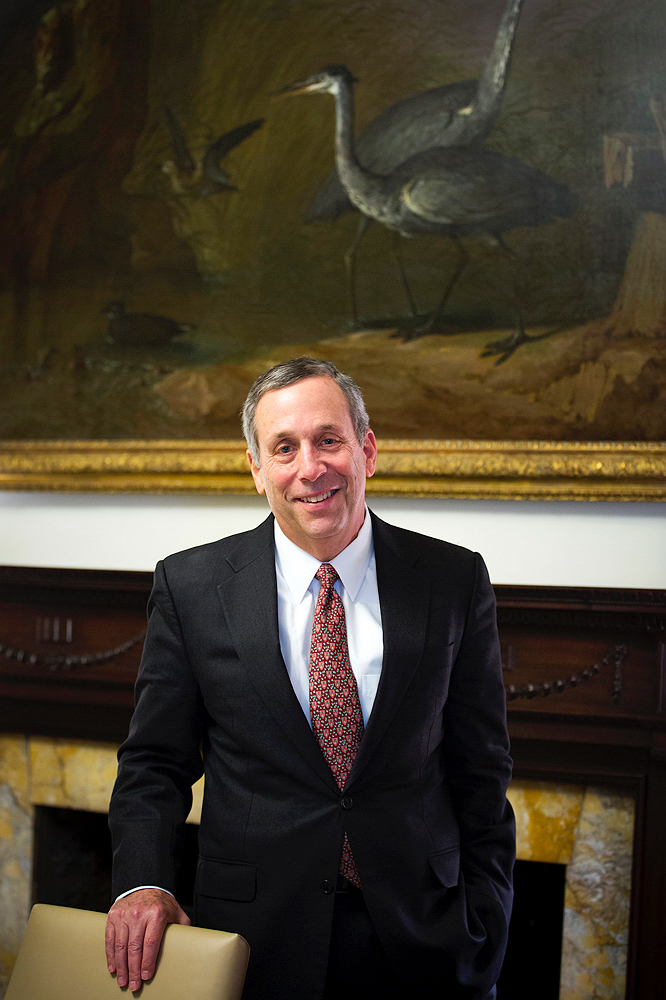
Harvard Public Affairs & Communications
Lawrence Bacow, former president of Tufts University and former chancellor of the Massachusetts Institute of Technology, will be Harvard’s 29th president, the university announced in a statement Sunday.
Bacow, a lawyer and economist with decades of experience in higher education governance, will assume the presidency on July 1. As president of Tufts, he led the university’s largest-ever capital campaign, expanded financial aid and diversity initiatives and strengthened the university’s relationship with its primary teaching hospital, Tufts Medical Center. He previously served on the faculty of MIT for 24 years as chancellor, chair of the faculty, and a professor of environmental studies. “I congratulate Harvard for choosing Larry Bacow, an accomplished leader, as its 29th president,” University President Peter Salovey said in a statement to the News. “As president of Tufts, Larry has demonstrated his ability to pilot a great institution. I am grateful to Drew Faust for her integrity, leadership, and friendship, and I look forward to working with Larry.”
The last year has been tumultuous for higher education, as universities across the country have faced greater financial pressure, setbacks for undocumented students and the rollback of the 2011 “Dear Colleague Letter,” which shaped the adjudication of sexual misconduct at universities. And like Yale, Harvard and dozens of other universities are grappling with the 1.4 percent endowment tax imposed by the recently passed Republican tax bill.
Bacow, whose research focuses on environmental policy, has a doctorate and masters in public policy, along with a juris doctorate.
“This is a pivotal moment for higher education — one full of extraordinary possibilities to pursue new knowledge, enhance education and serve society, but also a time when the singular value of higher education and university research has too often been challenged and called into doubt,” William F. Lee, the senior fellow of the Harvard Corporation and the chair of the presidential search committee, said in a statement. “Such a time calls for skillful leadership, strategic thinking, and disciplined execution. Larry will provide just that.”
Bacow has a long history at Harvard. He is a member of the Harvard Corporation and was a member of the presidential search committee until he withdrew in mid-December after search consultants informed Bacow that he would be considered for the position. Bacow received his J.D., master’s degree and doctorate from Harvard.
This was not the first time Bacow was considered for Harvard’s presidency. After Lawrence Summers announced that he would resign in 2006, Bacow was reportedly on Harvard’s shortlist for the position.
The presidential search committee, composed of the 12 members of the Harvard Corporation and three members of the Board of Overseers, has been working to fill the position and narrow its search from the initial set of 700 candidates since last June.
Bacow will succeed Drew Gilpin Faust, who announced last June that she would step down after serving as president for a decade. Faust is the first woman to serve as the University’s president. Yale, along with only two other Ivy League schools, has never had a female president.
Under Faust, Harvard replaced the title “house master” with “faculty dean,” and Harvard Law School changed its seal because the original symbol was tied to a slave-owning family. She also oversaw the expansion of Harvard’s campus and its financial aid program, as well as an $8 billion capital campaign. In Dec. 2017, Faust announced that the Harvard Corporation had approved the set of penalties on members of single-gender social organizations, which took effect with the class of 2021.
Faust has been an outspoken opponent of many of the Trump administration’s decisions. In a Bloomberg media roundtable, she called the administration “unpredictable” and untied to “traditional notions of the role of government,” according to the Boston Globe. She met with Senate Majority Leader Mitch McConnell and Senate Minority Leader Chuck Schumer last January and plans to meet with others members of Congress again in late April. By contrast, Salovey has declined to name the specific congressmen with whom he meets, arguing that keeping the meetings confidential will prevent the politicians from “posturing for the coverage that they think will be given to the press in the interaction.”
Bacow’s appointment arrives as Harvard faces a probe by the Justice Department into its affirmative action policies. In 2015, a lawsuit against Harvard alleged racial discrimination against Asian-Americans in Harvard’s admissions practices. The Justice Department is investigating the university’s compliance with Title VI of the 1964 Civil Rights Act, which bars institutions that receive federal funding from discriminating on the basis of race, color or national origin.
Harvard University was established in 1636.
Hailey Fuchs | hailey.fuchs@yale.edu







